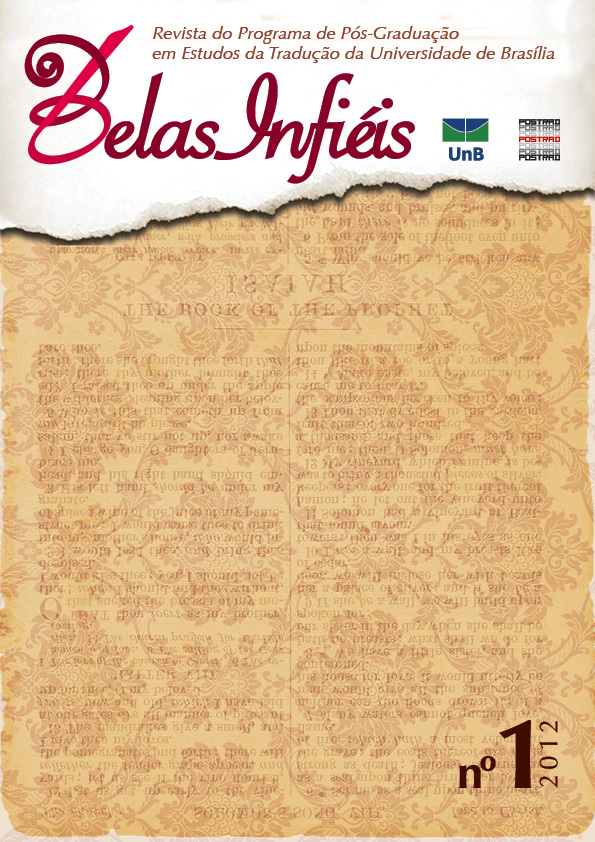SOBRE A PRÁTICA TRADUTÓRIA DE ROMANCES NO SÉCULO XIX:
O EXEMPLO DE UMA VERSÃO PORTUGUESA DE LES INTRIGANTS DE PAUL DE KOCK
DOI:
https://doi.org/10.26512/belasinfieis.v1.n1.2012.11159Palabras clave:
Paul de Kock, romance, século XIX, traduçãoResumen
Ao longo do tempo, a prática tradutória vem sendo discutida por intelectuais e teóricos do traduzir que, de maneira geral, propõem uma ética tradutória e tentam estabelecer modos adequados de proceder à modificação de um texto escrito em uma língua para outra. Em meio à s várias propostas teóricas que indicam um modo de conduzir a prática, destacam-se teóricos tradutores explicitamente preocupados com fidelidade e ética. Contudo, é sabido que teoria e prática da tradução estão estritamente vinculadas a um contexto histórico-cultural. Tendo isso em vista, o presente trabalho objetiva investigar o que significava essa prática no contexto do século XIX; como alguns intelectuais da época a pensavam, bem como realizar breve análise de uma tradução portuguesa do romance Les intrigants, de autoria de Paul de Kock, considerado um dos romancistas franceses mais populares no século XIX.
Descargas
Citas
TEXTOS CRÃTICOS E LITERÁRIOS
ABREU, Márcia. Trajetórias do romance: circulação, leitura e escrita nos séculos XVIII e XIX. São Paulo: Mercado de Letras, 2008.
BENJAMIN, Walter. A tarefa do tradutor, de Walter Benjamin:Quatro traduções para o português. Organização de Lúcia Castello Branco. Belo Horizonte, Fale/UFMG, 2008.
BERMAN, Antoine. A prova do estrangeiro: Cultura e tradução na Alemanha romântica. Tradução de Maria Emília Pereira Chanut. Bauru: EdUSC, 1984.
CAMPOS, Haroldo de. A palavra vermelha de Hoelderlin. In: A arte no horizonte do provável e outros ensaios. 3. Ed. São Paulo: Perspectiva, 1975.
CANDIDO, Antonio. A formação da Literatura Brasileira: Momentos decisivos. São Paulo: Martins, 1997.
FIGUEIREDO, Fidelino de. História literária de Portugal (século XII-XX). 3 ed. São Paulo: Companhia Editora nacional, 1966.
HEINEBERG, Ilana. Miméticos, aclimatados e transformadores: trajetórias do romance-folhetim em diários fluminenses. In: ABREU, Márcia. Trajetórias do romance: circulação, leitura e escrita nos séculos XVIII e XIX. São Paulo: Mercado de Letras, 2008.
KOCK, Paulo de. Os intrujões. Versão livre de Caetano Augusto Coelho. Volume II. Lisboa: Typografia de Salles, 1875.
RICHARDSON, Samuel. Pamella ou a virtude recompensada. Tradução de D. Felix Moreno de Monroy. Lisboa: Offic. De Joaquim Thomas de Aquino, 1799.
VASCONCELOS, Sandra Guardini. Leituras inglesas no Brasil oitocentista.Crop:revista da área de Língua inglesa e norte-americana do Departamento deLetras Modernas/FFLCH. USP,n.8,p. 223-247,2012.
TEXTOS ELETRÔNICOS
CARRERA, Vivina Almeida. Traduçãoem Portugal na segunda metade do século XIX. Disponível em:<http://translate.google.com.br/translate?hl=ptBR&langpair=en%7Cpt&u=http://www.trans.u ma.es/pdf/Trans_14/t14_117-123_VAlmeida.pdf>. Acesso em:23 fev. 2012.
KOCK, Paul de. Les intrigants. Volume II. Paris: Jules Rouff e Cie, 1884, p. 53. Disponível em:<http://translate.google.com.br/translate?hl=ptBR&langpair=fr%7Cpt&u=http://gallica.bnf.fr/ark:/12148/bpt6k55511949>. Acesso em:20 de fev. 2012.
PEREIRA, Caio Heleno da Costa. Sobre os diferentes métodos da tradução:a tradução no contexto político-pedagógico da bildung. 2008. 36 p. Monografia. Setor de Ciências humanas, Letras e Artes, Universidade do Paraná, Curitiba, 2008. Disponível em: <http://www.letras.ufpr.br/documentos/graduacao/monografias/ps_2008/Caio_Heleno.pdf>.
RODRIGUES, Cristina Carneiro. A prática da tradução por teóricos tradutores.Disponível em: <http://www.maxwell.lambda.ele.puc-rio.br/11087/11087.PDF>. Acesso em:23 fev.2012.
SALES, Germana Maria Araújo. Circulação de romances no século XIX. S. d. p. 1-12. Disponível em: <http://www.alb.com.br/anais17/txtcompletos/sem17/COLE_1360.pdf>. Acesso em:13 Jan. 2012.
VASCONCELOS, Sandra Guardini T. A formação do romance brasileiro: 1808-1860 (vertentes inglesas). Disponível em: <http://www.caminhosdoromance.iel.unicamp.br/. Acesso em:14 nov.2011.
<http://educaterra.terra.com.br/voltaire/antiga/2005/12/26/000.htm>. Acesso em:14 Jan. 2012
http://pt.wikipedia.org/wiki/Rapariga. Acesso em:14 Jan. 2012
<http://translate.google.com.br/translate?hl=ptBR&langpair=fr%7Cpt&u=http://gallica.bnf.fr/ark:/12148/bpt6k55511949>. Acesso em:13 jan. 2012.
<http://www.bn.br/portal/>. Acesso em:28 nov. 2012.
Descargas
Publicado
Cómo citar
Número
Sección
Licencia
Copyright Statement
Given the public access to this journal, the texts are free to use but requires the recognition of the original authorship and initial publication in this journal to be properly stated.
The journal allows the use of works published for non-commercial purposes, including the right to submit the work to publicly accessible databases. Published contributions are the sole and exclusive responsibility of the author(s).
- When submitting papers to be evaluated by the Belas Infiéis journal, the author(s):
- Declare that the contents of the contributions are original and of their original creation, being entirely responsible for their content if there is an objection by third parties.
- Claim to be aware that they should not commit academic plagiarism.
- Declare that the manuscript has not been published, completely or partially, in Portuguese or another language. If it is a translation it should be submitted to the Translated Articles section.
- Declare that the manuscript is not being evaluated by other journals.
- Declare that the manuscript was not submitted to another journal simultaneously.
- Commit(s) to inform the journal of any kind of error or inaccuracy in their contribution (published, in evaluation or in editing) and to collaborate with the editors to make due corrections of the article (when in evaluation or editing) or erratum/retraction (after publication).
- Declare that there is no conflict of interest regarding the published work.
- Authorize its release if it is accepted for publication without any kind of monetary compensation.
- Agree to assign non-exclusive rights to publication to the magazine, remaining free to make their contribution available in other media as long as the publication of the first version in Belas Infiéis magazine is mentioned. They also authorize Belas Infiéis to assign their texts for reproduction in content indexers, virtual libraries and similar platforms.
- Maintain copyright and grant the journal the right of first publication, the work being licensed under theCreative Commons Attribution License.
- Is/Are allowed and encouraged to publish and distribute their work online after the editorial process, which may increase the impact and citation of the published work.
- Authorize the editorial team to make textual adjustments and to adapt the article to the publication rules, when necessary.



















